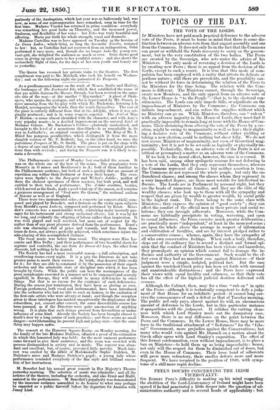TOPICS OF THE DAY.
THE VOTE OF THE LORDS.
IF Ministers have not paid much practical deference to the adverse vote of the Peers, it must be borne in mind that there is some dis- tinction between an adverse vote from that august assembly and one from the Commons. It does not only lie in the fact that the Commons can grant or withhold the funds necessary to carry on the govern- ment, but in the very constitution of the two bodies. The Peers are created by the Sovereign, who acts under the advice of his Ministers. The only mode of reversing a decision of the Lords is by creating new Peers ; there is no appeal from the decision of the Lords, except to such a resort. It is true that this mode of com- pulsion has been employed with a rarity that attests its delicate or perilous nature ; still there are precedents, and the possibility can- not be without its force in determining the relation of the Peers to the Ministers for the time being. The relation with the Com- mons is different- The Ministers cannot, through the Sovereign, create new Members, and the only appeal from an adverse vote of the Lower House is " to the People "—that is, to the electoral con- stituencies. The Lords can only impede bills, or adjudicate on the impeachment of Ministers by the Commons ; the Commons can initiate impeachment, and can refuse the supplies without which no Ministry can go on. 'While Ministers, therefore, can " rub on" with an adverse majority in the House of Lords, they must find it practically impossible to remain long at issue with the House of Com- mons. Their abstaining from altering the vote of the Peers by a cre- ation, might be owing to magnanimity as well as fear ; their slight- ing a decisive vote of the Commons, without either yielding or taking a new election, could be nothing but sheer folly. We do not now accuse Ministers of magnanimity, not even of theoretical mag- nanimity ; but it is not to be set aside as logically or physically im- possible. Technically, then, an adverse vote of the Peers is not so critical or peremptory a matter as an adverse vote of the Commons.
If we look to the moral effect, however, the case is reversed. It has been said, among other apologetic reasons for not deferring to a vote of the Lords, that they only represent themselves, whereas the Commons represent all classes : but neither assertion is true. The Commons do not represent the whole people, but only the en- franchised classes ; and among the classes whom they represent in a very imperfect degree, are those most notable for intellectual in- fluence. The Lords are in Parliament by personal right, but they are the heads of numerous families, and they are the elite of the
wealthy classes; who look up to them with all the sympathy and respect that are given by wealth to greater wealth, by social pride to the highest rank. The Peers belong to the same class with Ministers ; they express the opinion of " good society " ; they can affect the comfort of the official men in their private and social re- lations ; they can inveigle adherents. Moreover, while the Com- mons are habitually precipitate in voting, wavering, and open to casual influences, the Peers exercise much greater deliberation ; are practically more " independent," at least in the moneyed sense ; are upon the whole above the average in respect of information and cultivation of faculties, and are by interest pledged rather to a conservative course ; whence, again, they have the sympathy of all who own conservative feelings. When such a body, therefore, steps out of its ordinary line to record a distinct and formal opi- nion that the conduct of Ministers has been vicious and hazardous, they promulgate an opinion which cannot fail to damage the in- fluence and authority of the Government. Such would be the ef- fect even if they had no manifest case against Ministers—if their judgment were a simple, isolated, political fact. But the case against the wretched Greek policy has been set forth with unusual and unmistakeable distinctness ; and the Peers have expressed their views with equal lucidity and calmness, so that their vote has all the effect of the highest judicial decision delivered with reasons.
Although the Cabinet, then, may for a time " rub on " in spite of the Peers—although it is technically competent to defy a judg- ment of that House for an indefinite period—it cannot long sur- vive the consequences of such a defeat as that of Tuesday morning. The public not only pays, almost against its will, an unconscious amount of deference to the Lords, but in this particular instance
it sympathises with thejudgment. It relishes the cutting clear- ness with which Lord Stanley made out the damnatory case. Moreover, there is no real difference on the point between the Peers and the Commons. In the Lower House, there may be more force in the traditional attachment of " Reformers " for the "Libe- ral" Government, more prejudice against the Conservatives ; but many who would vote against Mr. Disraeli on a motion about the Greek affair agree with Lord Stanley's exposition. The effect of this formal condemnation, even without impeachment, is to place a ban on Ministers—to hold them up as being impeachable: hence, not only will the respect for them be diminished out of doors, but even in the House of Commons. Their loose band of adherents will grow more refractory, their smaller defeats more and more frequent. We have recurred to the position of 1840, with symp- toms of a still more rapid decline.


























 Previous page
Previous page